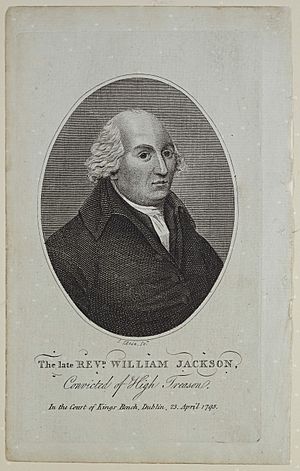William Jackson (journalist) facts for kids
William Jackson (born 1737 – died 1795) was an Irish preacher, journalist, and writer who held strong political views. He became well-known for his bold opinions and activities. In 1794, he was arrested in Dublin after meeting with leaders of the Society of United Irishmen, a group that wanted Ireland to be independent. Jackson died during his trial.
Contents
Early Life and Career
William Jackson was born in Newtownards, County Down, in 1737. He went to Oxford University and later became an Anglican priest. Not much is known about his early years. People found him charming, and he was popular for his preaching style. He also spoke out strongly about politics.
Jackson moved to London in the 1760s. He preached in churches there but eventually started working as a journalist to earn a living.
Working as a Newspaper Editor
In 1766, Jackson became the editor of a London newspaper called The Public Ledger. Under his leadership, the newspaper became very strong in its political opinions, often criticizing public figures.
Jackson became famous for his direct writing style. He was hired by Elizabeth Chudleigh, a woman known as the Duchess of Kingston, who was facing a big trial. She wanted Jackson to write positive stories about her in the newspaper. Jackson knew her history because her first husband had been his former employer. He became a trusted helper to her.
Jackson also got into a public argument with Samuel Foote, a famous actor and writer. Foote had written a play that made fun of Elizabeth Chudleigh's legal troubles. Chudleigh managed to stop the play from being shown. In response, Foote wrote another play that made fun of Jackson. Jackson then wrote poems criticizing Foote. This argument led to legal problems for Jackson, and he had to leave for France in 1777. However, he did not stay long because Foote died later that year.
Returning to England
After Samuel Foote died, Jackson came back to England. He continued his political work. In 1783, he published a book about the new American states.
The next year, he secretly began working for the Prime Minister, Pitt the Younger. Jackson wrote articles for The Morning Post that supported the government, even though he used to be against it. When people found out, he was criticized for changing his views. This made it hard for him to be involved in English politics.
Jackson was involved in another public event in 1787. He teamed up with an actor named John Palmer to build a new theatre in London. They convinced people to invest a lot of money in the Royalty Theatre. However, they did not have the official permission needed to run a theatre. So, the theatre was closed after only one night. The investors who lost money started legal action, and Jackson left for France again, just before the French Revolution began.
Political Activities in France and Ireland
While in Paris, Jackson became very interested in the French Revolution. He met with other British people who supported the revolution, including Lord Edward Fitzgerald and Thomas Paine. Jackson sided with a political group called the Jacobins. When England declared war on France, he published a pamphlet that criticized the English king.
In 1793, Jackson was briefly arrested along with other British citizens. He was released because of his strong support for the revolution. Later that year, he was asked by the French government to be a secret agent. His mission was to go to England and Ireland to find out if people there wanted to start a fight for independence.
Jackson arrived in London in early 1794. He met with John Cockayne, a lawyer he had known before. Jackson told Cockayne about his secret mission. Cockayne, fearing he would get into trouble, told the Prime Minister.
When Jackson went to Dublin, Cockayne went with him. In Ireland, they met with leaders of the Society of United Irishmen, including Wolfe Tone and Archibald Hamilton Rowan. Hamilton Rowan was interested in Jackson's talk of French help. He convinced Tone to write a report for the French, saying that the Irish were ready to rise up. Jackson made a mistake by sending Tone's report and other letters through the public mail. The authorities seized these letters, which led to Jackson's arrest on April 28, 1794.
Trial and Death
Jackson stayed in prison for a year before his trial. He asked for delays to prepare his defense. While in prison, he wrote his last book.
His trial began on April 23, 1795, in Dublin. He was found guilty. One week later, on the day he was supposed to be sentenced, Jackson appeared very ill in court. He became worse during the hearing, showing signs of great pain. The judges ordered a chair for him and called for a doctor. He then collapsed and died. An examination found that Jackson had taken a large amount of poison. He was survived by his wife, a son, and a daughter.
Images for kids
 | Calvin Brent |
 | Walter T. Bailey |
 | Martha Cassell Thompson |
 | Alberta Jeannette Cassell |



